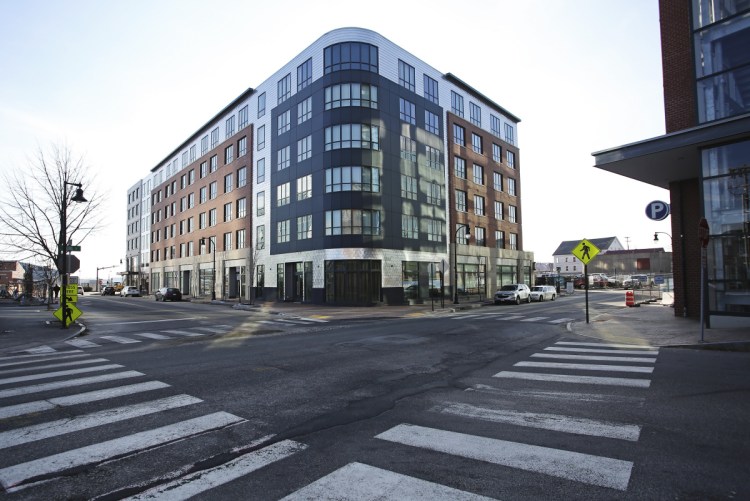The hotel building boom in Portland has prompted questions about whether new development is about to hit a ceiling. Lodging data from last year suggests it has not.
Portland hotels made more money per room this summer than any time in the last six years, even as new swanky hotels pop up along the city’s waterfront.
Revenue per available hotel room was more than $160 in August, a 35 percent increase from 2012 according to STR, a hospitality data firm from Tennessee. The average daily room rate that month neared $188, almost $60 more than the national average and almost 88 percent of the city’s hotel rooms were occupied.

The city’s hot tourism market easily absorbed hundreds of rooms in expensive waterfront hotels that have been added in the last five years, said Nicholas Farrell, a broker with Daigle Properties, a hospitality real estate firm. Revenue per room keeps climbing and so do occupancy rates, especially during the busy summer months.
“I think Portland in general was lacking inventory, but I think we are catching up,” Farrell said. “It will be really interesting to see what happens in the next couple years.”
Portland hotel revenues and occupancy rates rose throughout the year, the third consecutive year of surging numbers. Revenue from average daily room rates was up 4 percent; revenue per available room was up 10.2 percent; and occupancy rates were up 3.8 percent over 2017.
Still, Farrell said he can understand why people are skeptical of new hotel construction and a flurry of plans for more boutique lodging.
“We are still seeing all these proposals. Eventually, it has to catch up, you can’t just have new supply all the time,” he said. “I’m guessing developers are starting to become a little more wary.”
Even if that is the case, new supply seems to be in the pipeline.

Proposed hotel developments on Portland’s waterfront could add as many as 700 new rooms to the market. Some projects have been approved by city planners, such as a 155-room hotel and mixed-use development at 383 Commercial St. recently bought by New Hampshire and Florida company Norwich Partners.
Other hotels are still in the planning phase, such a 135-room boutique property on Commercial Street planned by Jim Brady, a 93-room hotel in a complex on Fisherman’s Wharf from developer David Bateman and a 148-room hotel in the Thompson’s Point Redevelopment.
Hotel developers will concentrate on waterfront sites along Commercial Street, at the expense of properties just blocks away, said David Leatherwood, a managing member of Norwich Partners.
“From a common sense perspective, if you are a visitor to Portland you want to be downtown on the waterfront,” Leatherwood said.
Norwich owns the newly opened 178-room AC Hotel on Fore Street and a Residence Inn by Marriott on Hancock Street.
The Portland market is good, but reaching saturation, Leatherwood said. As more waterfront rooms become available, hotels further inland will drop prices, dragging rates and revenue down across the board, he suspects.
“We are certainly concerned about the supply,” he said. “If you are more than a block away from Commercial Street, you are going to be in a drain on the market in future years.”
In the meantime, the picture looks rosy.
In January, typically the slowest month for Portland hotels, the occupancy rate was 42.5 percent, almost 9 percent higher than in 2012. As of the end of November, occupancy was up 4 percent, average daily rates 2 percent and revenue per available room up 6 percent compared to last year, according to STR.
The city’s heralded food and beverage scene draws overnight visitors year-round and plans have emerged again to build a convention center that could take advantage of available rooms during the shoulder season.
“It doesn’t appear that the hotel market is oversaturated with new supply,” said Bobby Bowers, senior vice president of operations at STR.
Portland is like other up-and-coming cities with lots of upscale housing and business construction that can give residents anxiety about too much new development, he added.
“People are intimidated by the change – I think on the hotel side of things people are beginning to ask how much is too much,” he said.
“It just doesn’t appear that a lot of new supply has hit yet.”
Send questions/comments to the editors.




Comments are no longer available on this story